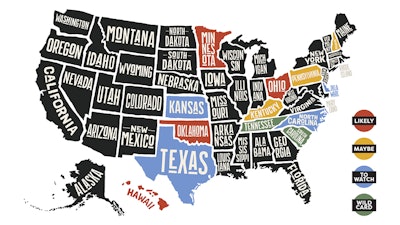
Editor's note: Our 2024 cannabis legalization forecast is out! View that list here.
After a middling showing from cannabis in the November 2022 election (with state legalization measures going 2-for-5), it’s hard to say how political momentum may shape reform efforts in 2023. We’re as hopeful as ever, on one hand, but at the same time it’s not like legalization has sped up in any meaningful way. We’re still waiting with bated breath for action from the federal government, and most state legislatures present a Democrat-Republican schism that leaves cannabis as little more than a coin toss.
And yet we do enjoy prognosticating at the start of the year. Surely, by year’s end, at least a few states will have passed some measure of cannabis reform, advancing the fragmented U.S. market in some way. We report on those efforts throughout the year, and we’re taking our best shot at predicting what may happen.
Here, we’ve put together our annual list of states that are likely to legalize, states that might legalize, states “to watch” closely for signs of legalization, and wild cards—where surprises await in legislative sessions.
Let us know how your own predictions line up. Are you working in a state that has a good chance of passing some form of legalization this year? Share your business goals with us, and we’ll work to find out what’s happening in the halls of government or in the run-up to elections.
Confirmed

Kentucky Gov. Andy Beshear signed an executive order Nov. 15, 2022, to allow Kentuckians with qualifying medical conditions to possess and consume small amounts of legally purchased cannabis to treat their conditions. As of Jan. 1, Kentuckians with qualifying medical conditions can possess up to 8 ounces of cannabis at a time. They must keep a receipt of where they legally purchased the product.
He noted that the executive order is not a substitute to legalize medical cannabis in the state and that he would work with legislators this 2023 session to push for legalization again–which seems to be in motion, as three bills have been introduced thus far in 2023—two in the House and one in the Senate—to legalize cannabis at some capacity.
House Bill 47, introduced Jan. 3, would allow adults 21 years and older to consume up to 1 ounce of cannabis for personal use without penalty, while House Bill 22 and Senate Bill 51, both introduced Jan. 3, would establish a Cannabis Control Board to administer the cultivation, processing, transportation, sale, use, taxation and licensing of medical and adult-use cannabis.
Update: Kentucky legalized medical cannabis, with Beshear signing the bill March 30.
-Andriana Ruscitto, Associate Editor

Ohio is one of the lead contenders to legalize adult-use cannabis in 2023 after missing the statewide ballot this past November.
Advocates from the Coalition to Regulate Marijuana Like Alcohol (CRMLA) suspended their 2022 ballot campaign after claiming GOP leaders in the Ohio House and Senate were trying to block their initiative on a signature-gathering technicality. The group came short of submitting the roughly 133,000 valid signatures required before a Jan. 3 deadline. That threshold wasn’t met until CRMLA organizers submitted additional signatures 10 days later.
Rather than risk losing those valid signatures, which were certified by Secretary of State Frank LaRose, the legalization advocates reached a settlement in a lawsuit they filed against the GOP leadership. As part of the settlement, they retained the certified signatures for their proposed statute entering this year’s renewed push.
Now, the Ohio General Assembly has until May 3, 2023, to consider the proposal legislatively. If the lawmakers fail to pass or act on the proposal, then CRMLA organizers would need to gather another roughly 124,000 valid signatures (3% of votes cast in the preceding gubernatorial election) to place their initiative on the ballot.
Roughly 60% of Ohioans support adult-use cannabis legalization, while 37% oppose it, according to a late-September 2022 poll conducted by Spectrum News in in partnership with Siena College Research Institute.
-Tony Lange, Associate Editor

An adult-use cannabis legalization bill hit the end of the road last year when lawmakers in the Minnesota Senate blocked a floor vote on the legislation.
The issue has since resurfaced in the Legislature, however, after Gov. Tim Walz said in November that legalization is a priority for this year’s legislative session.
Lawmakers filed a 243-page adult-use cannabis legalization bill, House File 100, in January, and the legislation’s sponsors told the Minnesota Post last month that the bill “is likely to pass” this year.
Meanwhile, Walz included adult-use cannabis legalization in his 2023 state budget proposal, according to a CBS Minnesota report.
-Melissa Schiller, Senior Digital Editor

Hawaii represents the oldest medical cannabis market that has yet to expand to adult-use legalization in the U.S.
In 2000, Hawaii became the sixth state to legalize medical cannabis but the first to do so through state legislature.
Now, Hawaii could be the 22nd state to legalize adult-use cannabis under recently inaugurated Joshua Green’s governorship. During a gubernatorial debate in October, the Democrat said he would support a legalization bill should it be approved by the Legislature, as well as regulating cannabis like tobacco and investing tax revenue in the mental health care system.
Those words came after former Gov. David Ige, whom Green served as lieutenant governor, opposed full cannabis reform during his eight years in the executive office.
With a veto threat now off the table, Rep. Jeanné Kapela and Sen. Chris Lee—both Democrats—filed companion legislation Jan. 20 to legalize adult-use cannabis in Hawaii. They have 13 original cosponsors between their respective chambers.
Their proposal aims to allow adults 21 years and older to purchase up to 4 ounces of cannabis flower or its equivalent within in a 15-day period, according to the bill’s text. Adults would also be allowed to home cultivate up to 10 cannabis plants.
-Lange
Maybe

Lawmakers in the New Hampshire Senate shot down a pair of House-approved adult-use cannabis legalization bills last year—one would have legalized a commercial adult-use market, while the other would have authorized personal possession and home cultivation.
A bipartisan group of lawmakers in the House announced plans in December to introduce a new legalization bill this year.
“The House has long stood united in finding a pathway to getting this done for Granite Staters,” House Majority Leader Jason Osborne told NHPR. “With any luck, the Senate will come around to supporting the will of the vast majority of New Hampshire citizens.”
It’s not just the Senate that legalization advocates have to worry about, however; as Cannabis Business Times previously reported, Gov Chris Sununu has supported decriminalization, expungement and New Hampshire’s medical cannabis program, but his voting record regarding patient access is mixed.
In 2019, for example, Sununu vetoed legislation that would have ended a requirement for patients to have at least a three-month relationship with a provider before receiving their medical cannabis certification.
The New Hampshire House approved legislation in April to legalize the possession, purchase, use, gift and transport of cannabis for adults 21 and older. The Senate, however, killed the bill in May.
Following the legislation's defeat in the Senate, Sununu issued a statement in support of an adult-use cannabis market that is regulated similarly to how New Hampshire controls liquor sales.
"NH is the only state in New England where recreational use is not legal," Sununu said. "Knowing that a majority of our residents support legalization, it is reasonable to assume change is inevitable. To ignore this reality would be shortsighted and harmful. That is why, with the right policy and framework in place, I stand ready to sign a legalization bill that puts the State of NH in the driver's seat, focusing on harm reduction—not profits. Similar to our liquor sales, this path helps to keep substances away from kids by ensuring the State of New Hampshire retains control of marketing, sales, and distribution — eliminating any need for additional taxes. As such, the bill that was defeated in NH this session was not the right path for our state."
It remains to be seen whether the Legislature can approve an adult-use legalization measure that Sununu will support.
-Schiller

Former Pennsylvania Gov. Tom Wolf included adult-use cannabis legalization in his 2021 state budget proposal, but the issue failed to gain support in the General Assembly. Former Pennsylvania State Attorney General Josh Shapiro (D) declared victory as governor in the state’s gubernatorial race Nov. 8, 2022.
On Nov. 16, 2022, Democrats won control over Pennsylvania’s House of Representatives for the first time in over a decade. With Shapiro in office and a Democratic-controlled House, it left some in the industry optimistic that 2023 could be the year of adult-use legalization in Pennsylvania. However, since November 2022, one member of the House has passed, and two have left their seats for higher offices, so now, three vacancies remain.
With three vacancies in the House and a GOP-controlled Senate, the future of adult-use legalization in the state remains unclear. Trent Woloveck, chief commercial director of Jushi Holdings, told CBT in November that “this is an opportunity to find areas of common ground and for both parties to work together. Common sense cannabis reform has always been a bipartisan policy and an early area for both parties to work in the best interests of the commonwealth now that the legislative power is divided. Fortunately, both parties have dedicated leaders working toward that end.”
-Ruscitto
To Watch

State Rep. Ed Osienski, a longtime champion of Delaware cannabis reform (though he has yet to see a legalization bill cross the finish line in the General Assembly) is back in 2023 with House Bills 1 and 2.
Last year, under Osienski’s sponsorship, two very similar bills nearly made it into law. One, a decriminalization bill, was vetoed by Democratic Gov. John Carney. The other, a more formal legalize-and-regulate adult-use cannabis bill, failed to pass, thanks in part to one legislator’s untimely sick day.
Osienski has not been deterred. While we’re not ready to advance Delaware to “Likely” legalization this year (we’re watching you, Carney), it does seem like momentum is swinging in a positive direction for Osienski’s mission. Recent adult-use cannabis legalization in neighboring Maryland and New Jersey can only help his case.
“We have spent the past several years educating members about the merits of this program and dispelling the misconceptions that have persisted,” Osienski said. “I’m optimistic that we have the support to make this effort a reality.”
- Eric Sandy, Digital Editor

A medical cannabis legalization bill, known as the NC Compassionate Care Act, passed the North Carolina Senate last year before ultimately stalling in the House.
The legislation’s primary sponsors, Sens. Bill Rabon, R-Brunswick, Michael Lee, R-New Hanover, and Paul Lowe, D-Forsyth, refiled the bill this year as Senate Bill 3.
“Sen. Rabon has been the driving force on the medical marijuana bill that passed the Senate last time and did not pass the house,” Senate Leader Phil Berger, R-Rockingham, told The Carolina Journal in late January, when lawmakers reintroduced the NC Compassionate Act in that chamber. Berger recently reappointed Rabon as the chairman of the Rules and Operations Committee, one of the most powerful committees in the Senate, according to the news outlet.
“I think time will help and we’ll see whether or not this session is the right time,” Berger continued. “I think it’s the right thing for us to do. My thought is that the bill that passed the Senate last time was well constructed and addressed a lot of the concerns that people have.”
Attorneys at Fox Rothschild recently outlined the bill as one to watch this year, saying that the legislation’s bipartisan support in the North Carolina Senate suggests that it has a decent chance of passing the Legislature.
“We anticipate a hard push in 2023 to adopt this law or some other version of it because North Carolinians support it,” the attorneys wrote, citing 2021 and 2022 studies revealing that roughly 70% of North Carolinians favor medical cannabis legalization.
-Schiller

Is medical cannabis legal in Texas? The answer to that question perhaps depends on how one defines “medical cannabis.”
Texas lawmakers passed legislation in 2015 to create the state’s Compassionate-Use Program (CUP), which initially allowed patients with intractable epilepsy to access low-THC cannabis. Lawmakers expanded CUP in 2019 to include additional qualifying conditions, such as multiple sclerosis and terminal cancer.
The program was expanded again in 2021, allowing those with all forms of cancer and post-traumatic stress disorder to qualify for access. Also, the THC limit was increased from 0.5% to 1% for products in the marketplace. That limit trends closer to hemp’s 0.3% THC potency cap than to what’s legally available in most other medical cannabis markets in the U.S.
With Texas’ 2023 legislative session underway—Texas is one of four states where legislators only meet in odd numbered years—pressure is mounting for yet another expansion. In 2022, CUP patient counts increased from roughly 18,000 to more than 43,000, according to the Texas Department of Public Safety. In addition, 2 million Texans say they use cannabis products regulatory, according to Gallup pollsters, Spectrum News reported.
Furthermore, 83% of Texans support medical cannabis legalization, while 55% support adult-use cannabis legalization, according to a statewide survey conducted in December by the University of Texas / Texas Politics Project Poll.
-Lange

Several efforts to legalize medical cannabis in Kansas during the 2022 legislative session failed, “including a medical cannabis proposal that stalled in the Senate in May [2022], a House-passed bill that never gained traction in the Senate, and a Senate bill introduced by Sen. Rob Olson, R-Olathe, in March [2022],” CBT previously reported.
During the 2022 Special Committee on Medical Marijuana’s meeting Dec. 9, Sen. Olson, who chairs the committee, said he plans to introduce legislation in the Senate to legalize medical cannabis at the start of this legislative session; however, a measure has yet to be introduced.
-Ruscitto
Wild Card

No state has legalized adult-use cannabis before first legalizing medical cannabis. As one of our wild cards for 2023, Tennessee may break that mold.
Tennessee Sen. Heidi Campbell and Rep. Bob Freeman, both Democrats, have jointly introduced the Free All Cannabis for Tennesseans Act (the “FACT Act” for short). As Campbell said in her announcement of the bill, it’s getting to be high time that Tennessee makes a move. "We're already seeing that many states have legalized cannabis," Campbell said. "We're in a situation where we're missing out on that profit because people are going to other [states]."
Campbell and Freeman may be gung-ho, but The Tennessean reports that Republican lawmakers are unlikely to go along with this idea.
Lt. Gov. Randy McNally—not a legislator himself, but a high-ranking Republican public official—ranks among the most vocal opponents to cannabis legalization (and even delta-8 THC reform measures). And Gov. Bill Lee notably has not taken President Joe Biden up on his insistence that state governors begin pardoning individuals convicted of simple cannabis possession charges.
Those realities make for a tough road ahead for Campbell and Freeman’s bill. But, as anyone in this business knows, impossible things happen every day.
-Sandy

Home to U.S. Rep. Nancy Mace (“the weed lady,” according to some, maybe), South Carolina remains one of the few states without any legal cannabis program. After a marathon through the state legislature last year, a medical cannabis legalization bill died.
But hope is not lost, even if we are flagging South Carolina as a wild card this year.
Two bipartisan medical cannabis bills have been filed—the South Carolina Compassionate Care Act, an echo the 2022 bill, and the Put Patients First Act.
As of Feb. 1, neither bill had moved out of the South Carolina House Committee on Medical, Military, Public and Municipal Affairs, but we’ll keep watching.
-Sandy
Out of the Running

To be clear, State Question 820 will appear as the sole issue facing voters on March 7, providing a look at how cannabis might perform when it’s not situated within a general election or alongside Democratic candidates for public office.
Read a rundown of the ballot measure’s regulatory reform language here.
“We are grateful the voices of over 164,000 Oklahomans who signed the petition and want to vote on legalizing recreational marijuana for adults in Oklahoma have been heard,” Yes on 820 Campaign Director Michelle Tilley said in a public statement.
Editor's note: Oklahoma voters rejected SQ 820, leaving the state without much of a chance to legalize adult-use cannabis this year, after all.
- Sandy
The Path to 2024
We focused our attention on likely contenders for 2023 legalization, but several states already have efforts in motion for the 2024 ballot. That doesn’t mean that any of these states can’t go ahead and legalize cannabis in one form or another this year, but it does mean that political energy is being directed further down the line to the general election next year.

























